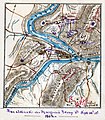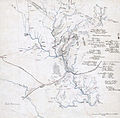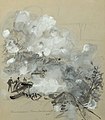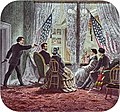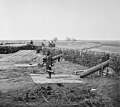 |  |

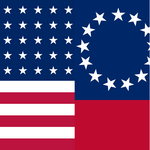
The American Civil War (1861–1865) was a sectional rebellion against the United States of America by the Confederate States, formed of eleven southern states' governments which moved to secede from the Union after the 1860 election of Abraham Lincoln as President of the United States. The Union's victory was eventually achieved by leveraging advantages in population, manufacturing and logistics and through a strategic naval blockade denying the Confederacy access to the world's markets.
In many ways, the conflict's central issues – the enslavement of African Americans, the role of constitutional federal government, and the rights of states – are still not completely resolved. Not surprisingly, the Confederate army's surrender at Appomattox on April 9,1865 did little to change many Americans' attitudes toward the potential powers of central government. The passage of the Thirteenth, Fourteenth and Fifteenth amendments to the Constitution in the years immediately following the war did not change the racial prejudice prevalent among Americans of the day; and the process of Reconstruction did not heal the deeply personal wounds inflicted by four brutal years of war and more than 970,000 casualties – 3 percent of the population, including approximately 560,000 deaths. As a result, controversies affected by the war's unresolved social, political, economic and racial tensions continue to shape contemporary American thought. The causes of the war, the reasons for the outcome, and even the name of the war itself are subjects of much discussion even today. (Full article)
The Army of the Tennessee was a Union army in the Western Theater of the American Civil War, named for the Tennessee River. A 2005 study of the army states that it "was present at most of the great battles that became turning points of the war—Fort Donelson, Vicksburg, and Atlanta" and "won the decisive battles in the decisive theater of the war."
It appears that the term "Army of the Tennessee" was first used within the Union Army in March 1862, to describe Union forces perhaps more properly described as the "Army of West Tennessee"; these were the troops under the command of Maj. Gen. Ulysses S. Grant in the Union's District of West Tennessee. This article also covers Grant's 1861–1862 commands – the District of Southeast Missouri and the District of Cairo – because the troops Grant led in the Battle of Belmont and the Henry-Donelson campaign during that period became the nucleus of the Army of the Tennessee. In April 1862, Grant's troops survived a severe test in the bloody Battle of Shiloh. Then, during six months marked by discouragement and anxiety for Grant, his army first joined with two other Union armies to prosecute the relatively bloodless Siege of Corinth and then strained to hold Union positions in Tennessee and Mississippi. In October 1862, Grant's command was reconfigured and elevated to departmental status, as the Department of the Tennessee; the title of his command was thus officially aligned with that of his army. Grant commanded these forces until after his critically important victory at Vicksburg on July 4, 1863. (Full article...)

During the American Civil War (1861–1865), Washington, D.C., the capital city of the United States, was the center of the Union war effort, which rapidly turned it from a small city into a major capital with full civic infrastructure and strong defenses.
The shock of the Union defeat at the First Battle of Bull Run in July 1861, with demoralized troops wandering the streets of the capital, caused President Abraham Lincoln to order extensive fortifications and a large garrison. That required an influx of troops, military suppliers and building contractors, which would set up a new demand for accommodation, including military hospitals. The abolition of slavery in Washington in 1862 also attracted many freedmen to the city. Except for one attempted invasion by Confederate cavalry leader Jubal Early in 1864, the capital remained impregnable. (Full article...)

John Young Brown (June 28, 1835 – January 11, 1904) was an American politician from the U.S. Commonwealth of Kentucky who represented the state in the United States House of Representatives and served as its 31st governor. Brown was elected to the House of Representatives for three non-consecutive terms, each of which was marred by controversy. He was first elected in 1859, despite his own protests that he was not yet twenty-five years old, the minimum age set by the Constitution for serving in the legislature. The voters of his district elected him anyway, but he was not allowed to take his seat until the Congress' second session, after he was of legal age to serve. After moving to Henderson, Kentucky, Brown was elected from that district in 1866. On this occasion, he was denied his seat because of alleged disloyalty to the Union during the Civil War. Voters in his district refused to elect another representative, and the seat remained vacant throughout the term to which Brown was elected. After an unsuccessful gubernatorial bid in 1871, Brown was again elected to the House in 1872 and served three consecutive terms. During his final term, he was officially censured for delivering a speech excoriating Massachusetts Representative Benjamin F. Butler. The censure was later expunged from the congressional record.
After his service in the House, Brown took a break from politics but re-entered the political arena as a candidate for governor of Kentucky in 1891. He secured the Democratic nomination in a four-way primary election, then convincingly won the general election over his Republican challenger, Andrew T. Wood. Brown's administration, and the state Democratic Party, were split between gold standard supporters (including Brown) and supporters of the free coinage of silver. Brown's was also the first administration to operate under the Kentucky Constitution of 1891, and most of the legislature's time was spent adapting the state's code of laws to the new constitution. Consequently, little of significance was accomplished during Brown's term. (Full article...)
- ... that Byron Root Pierce was Michigan's last living Civil War general?
- ... that The Land We Love, a little magazine that merged into Southern Magazine, printed American Civil War recollections, poetry, agricultural material, and many works by female authors?
- ... that Colonel Bradley Winslow was brevetted by US president Abraham Lincoln for "brave and gallant conduct" during the siege of Petersburg in the American Civil War?
- ... that Enoch Marvin Banks resigned from the University of Florida because of public outrage over his belief that the American Civil War was caused by slavery?
- ... that Dubuque, Arkansas, was destroyed in the American Civil War and is now covered by the waters of Bull Shoals Lake?
- ... that Emma Dean Powell received a pass from General Ulysses S. Grant to accompany her husband to battlefield camps during the American Civil War after he lost his arm?
- Attention needed
- ...to referencing and citation • ...to coverage and accuracy • ...to structure • ...to grammar • ...to supporting materials
- Popular pages
- Full list
- Cleanup needed
- The West Tennessee Raids
- Requested articles
- James Ashby (soldier) • Bluffton expedition • Benjamin D. Fearing • Charles A. Hickman • Richard Henry Jackson • James B. Speers • Charles S. Steedman • Battle of Barton's Station • Lawrence P. Graham • Thomas John Lucas • Daniel Henry Rucker • James Hughes Stokes • Frederick S. Sturmbaugh • Davis Tillson • Action at Nineveh (currently a redirect) • International response to the American Civil War • Spain and the American Civil War • Savannah Campaign Confederate order of battle • Native Americans in the American Civil War (currently disambiguation after deletion) • 1st Battalion, Mississippi Mounted Rifles (Union) • Battle of Lafayette • Requested American Civil War Medal of Honor recipients
- Expansion needed
- Battle of Boonsborough • Battle of Guard Hill • Battle of Rice's Station • Battle of Simmon's Bluff • Battle of Summit Point • Charleston Arsenal • Edenton Bell Battery • First Battle of Dalton • Blackshear Prison • Edwin Forbes • Hiram B. Granbury • Henry Thomas Harrison • Louis Hébert (colonel) • Benjamin G. Humphreys • Maynard Carbine • Hezekiah G. Spruill • Smith carbine • Edward C. Walthall • Confederate States Secretary of the Navy • Confederate States Secretary of the Treasury • David Henry Williams • Battle of Rome Cross Roads • Delaware in the American Civil War • Ironclad Board • United States Military Railroad • Kansas in the American Civil War • Rufus Daggett • Ebenezer Magoffin • Confederate Quartermaster-General's Department • First Corps, Army of Northern Virginia • Francis Laurens Vinton • Henry Maury • Smith's Expedition to Tupelo • Other American Civil War battle stubs • Other American Civil War stubs
- Images needed
- Battle of Lone Jack • Preston Pond, Jr. • Melancthon Smith
- Merging needed
- 1st Regiment New York Mounted Rifles and 7th Regiment New York Volunteer Cavalry
- Citations needed
- 1st Alabama Cavalry Regiment (Union) • 4th Maine Battery • 33rd Ohio Infantry • 110th New York Volunteer Infantry • Battle of Hatcher's Run • Camp Dennison • Confederate colonies • CSS Resolute • Dakota War of 1862 • Florida in the American Civil War • Ethan A. Hitchcock (general) • Fort Harker (Alabama) • Gettysburg (1993 film) • Iowa in the American Civil War • Second Battle of Fort Sumter • Samuel Benton
- Translation needed
- Add an article here!
The following Wikimedia Foundation sister projects provide more on this subject:
- Commons
Free media repository - Wikibooks
Free textbooks and manuals - Wikidata
Free knowledge base - Wikinews
Free-content news - Wikiquote
Collection of quotations - Wikisource
Free-content library - Wikiversity
Free learning tools - Wikivoyage
Free travel guide - Wiktionary
Dictionary and thesaurus
- Shortcuts to this page: Portal:ACW • P:ACW

